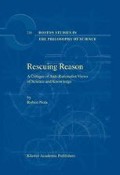Abstract
The works of Michel Foucault have had an extraordinary influence in sociology, history, literary studies, cultural studies - and in some cases even philosophy. Despite this it will be argued here that one of Foucault’s central doctrines exhibits many of the features, and thus the defects, of the sociology of science discussed in Part II. However his terminology and his emphasis on different factors such as power set him apart as a distinctive theoretician. Much of the commentary on Foucault is hagiographical. In part this is due to some quite pervasive obscurities that few commentators attempt to clarify while supporting Foucault’s general stance. But it is also in part due to the contagious mistrust of notions like truth and rationality in Foucault. His attack upon such notions has strongly influenced the postmodernist rejection of so-called ‘enlightenment’ intellectual values by his followers. But much of this, as will be argued, is simply mistaken. The mistake is in part due to an over-inflated account of what these “enlightenment” values might be, along with a poverty-stricken view of what are the current accounts of rationality in science and elsewhere (see chapter 1), and a failure to recognise the normativity of knowledge. In turning off the lights of the “enlightenment”, Foucault and his followers manage to undercut the very basis of their own doctrines. We need not turn to any “enlightenment” philosophers for an account of what these values might be; but some idea can be gleaned from the discussions in Part I of knowledge and our epistemic values, particularly chapter 1 where the idea of a critical tradition concerning science is outlined.
Access this chapter
Tax calculation will be finalised at checkout
Purchases are for personal use only
Preview
Unable to display preview. Download preview PDF.
Notes
Many commentators suppose that there is a strong connection between knowledge and power. Thus in the ‘Afterword’, Gordon (1980), pp. 233-7, takes the strong identity reading, as does Rouse (1987), p. 24. In chapter 11 of Kusch, (1991) the connection is said to be an internal-essential relation.
Foucault (1972) devotes Part IV chapter 1, pp. 135-40, to the distinction between archaeology and history of ideas; see also pp. 4-8.
See Collingwood (1972) Part I; Lakatos (1978) chapters 1 and 2; Carnap, ‘Empiricism, Semantics and Ontology’ in Carnap (1956), pp. 205-21.
This is not all that can be said on these matters. Nor is Foucault always consistent in his account of the difference between connaissance and savoir. Thus in a 1978 interview reprinted in Faubion (2000), pp.256-7, Foucault says: ‘I see ’savoir’ as a process by which the subject undergoes a modification through the very things that one knows [connaît]’, an example of such savoir being knowledge of ‘the economy while constituting oneself as a labouring subject’. This puts a different construal on the two kinds of knowledge that might not be wholly reconcilable with the account in the text. And oddly it is the “knower” that undergoes change.
For more on the historical background to Huntington’s Disease see Hayden (1981) or Harper (1991).
The terms ‘intentional object’ and ‘intentional inexistent’ can be found in Brentano, (1973) p. 88; but they have a much earlier origin in medieval philosophy.
Foucault does discuss empty descriptions such as ‘the golden mountain’ in Foucault (1972), pp. 88–96. But the discussion is tortuous. We are invited to consider not only the referent of statements but also the correlates of propositions and a statement’s referential, viz., ‘rules of existence for the objects that are named, designated or described within it [the statement], and for the relations that are affirmed or denied in it’ (ibid., p.91). But once again the objects are not given independently but are constructed.
Here the views of Devitt (1991) chapters 2 ands 13 are followed. However Devitt adopts a nominalism which eschews a strongly realist view of kinds.
The matters raised here about the construction of social reality are more fully discussed in chapters 1 to 5 of Searle (1995).
For one discussion of how we make classifications in biology see Sober (1988).
The example is suggested on pp. 254-5 of Windschuttle (1996).
See Ch. III and IV of Goodman (1955). The definition of ‘grue’ and ‘bleen’ given above is one of several variants.
There are many accounts of how an appeal to kinds can overcome some of Hume’s problems about induction. One of the more recent is Kornblith (1993).
While the accounts of reference fixing developed by Kripke and Putnam show how reference to objects and kinds can be invariant across discourses, other accounts can also do this. There is a Ramsey-Lewis style of definition that can be applied to fix the reference and meaning of the terms of our discourses, especially theoretical or non-observational terms and how they are attached to non-observables. For examples of this, especially the introduction of the term ‘cadaverous particle’ by Semmel weis, see Kroon and Nola (2001).
See chapter 10 of Kuhn (1970), and Feyerabend (1962), especially pp. 28-9. Their position is criticised in Kroon and Nola (2001).
For an account of reference-fixing for a variety of theoretical terms see Kroon and Nola (2001).
Author information
Authors and Affiliations
Rights and permissions
Copyright information
© 2003 Springer Science+Business Media Dordrecht
About this chapter
Cite this chapter
Nola, R. (2003). An Archaeological Dig Through Foucault’s Texts. In: Rescuing Reason. Boston Studies in the Philosophy of Science, vol 230. Springer, Dordrecht. https://doi.org/10.1007/978-94-010-0289-9_9
Download citation
DOI: https://doi.org/10.1007/978-94-010-0289-9_9
Publisher Name: Springer, Dordrecht
Print ISBN: 978-1-4020-1043-9
Online ISBN: 978-94-010-0289-9
eBook Packages: Springer Book Archive

